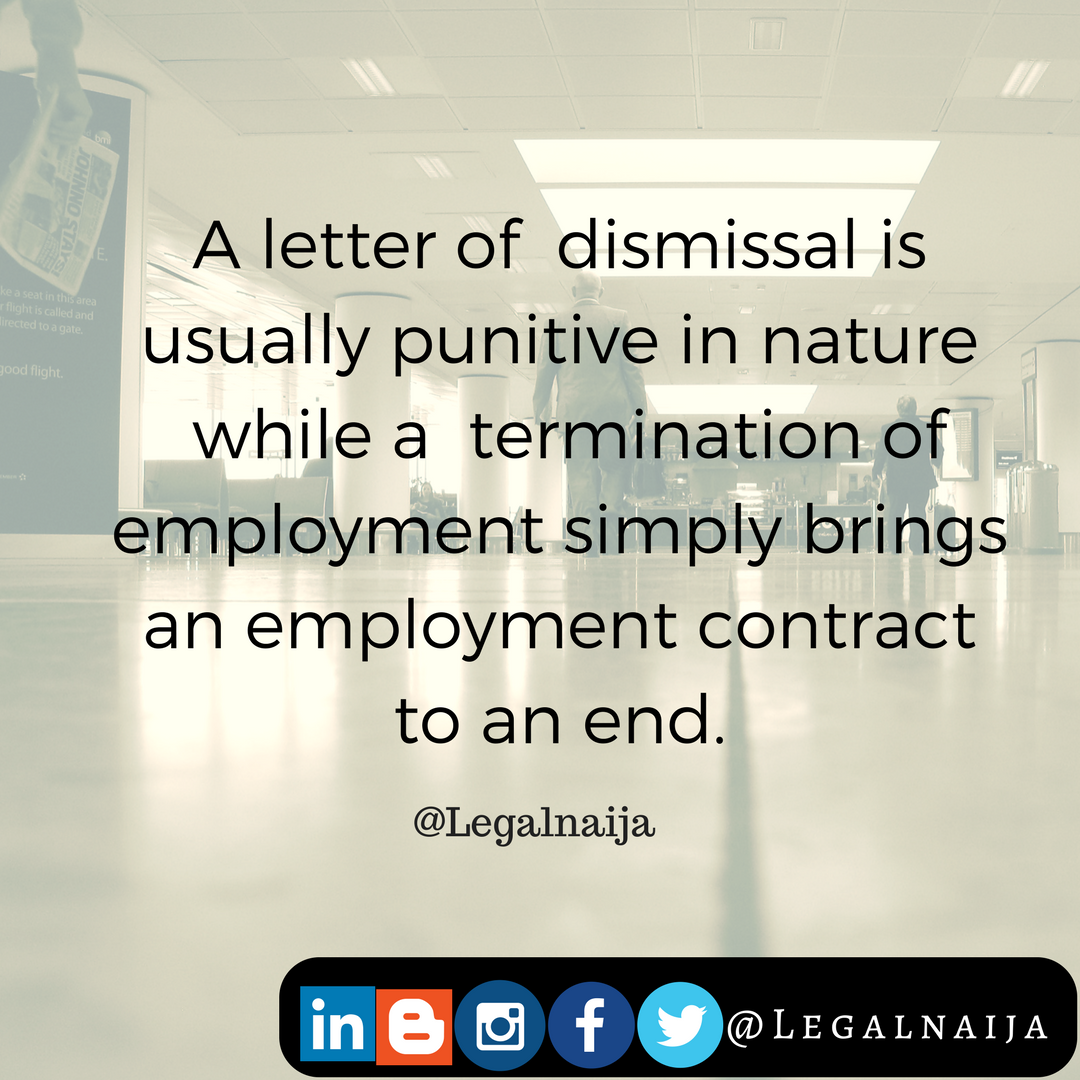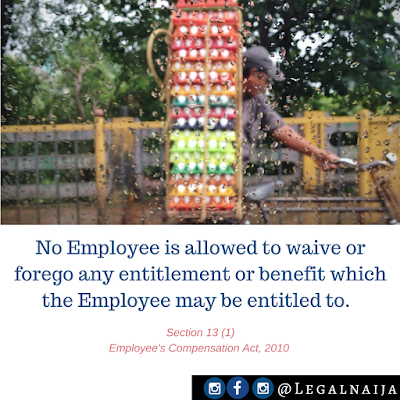
Difference between Letter of Dismissal & Letter of Termination | Adedunmade Onibokun

It
is important to note that an employment relationship cannot be forced upon
either an unwilling employer or employee. Therefore, an employer has a right to
hire and fire, likewise an employee has the right to resign from an employment.
is important to note that an employment relationship cannot be forced upon
either an unwilling employer or employee. Therefore, an employer has a right to
hire and fire, likewise an employee has the right to resign from an employment.
Many a times, the words “dismissal” and “termination”
are used interchangeably when referring to an employee whose employment has
seized. This may be appropriate in general
discussions, however, under the law, a dismissal and a termination of
employment have completely different interpretations and consequences. A letter
of resignation represents an employee’s desire to quit a job; however, the
effects of a letter of dismissal from an employer are quite different from
those of a letter of termination.
are used interchangeably when referring to an employee whose employment has
seized. This may be appropriate in general
discussions, however, under the law, a dismissal and a termination of
employment have completely different interpretations and consequences. A letter
of resignation represents an employee’s desire to quit a job; however, the
effects of a letter of dismissal from an employer are quite different from
those of a letter of termination.
The Oxford Dictionary describes the word “dismiss”
to mean to send away from one’s presence or employment, it also describes it as
meaning to “reject”. Likewise, a letter of dismissal is a rejection of the
employee by the employer, such rejection which is usually for a reason.
to mean to send away from one’s presence or employment, it also describes it as
meaning to “reject”. Likewise, a letter of dismissal is a rejection of the
employee by the employer, such rejection which is usually for a reason.
The first difference between a dismissal
and a termination is that a dismissal is usually punitive in nature while a
termination is simply bringing an employment contract to an end. This implies that
while an employer may well under the law terminate an employment, choosing to
rather dismiss an employee seeks to punish that employee for an act of
misconduct. This was illustrated in Eigbe V Nigeria Union Of Teachers (2007)
LPELR-8310(CA) where the court held that –
and a termination is that a dismissal is usually punitive in nature while a
termination is simply bringing an employment contract to an end. This implies that
while an employer may well under the law terminate an employment, choosing to
rather dismiss an employee seeks to punish that employee for an act of
misconduct. This was illustrated in Eigbe V Nigeria Union Of Teachers (2007)
LPELR-8310(CA) where the court held that –
“It is now well settled that in statutory
employment, as well as in private employment, the employer can dismiss an
employee where the accusations against such employee is of gross misconduct
involving dishonesty bordering on criminality, and in such a case, it is not
necessary, nor is it required under Section 36 (1) of the 1999 Constitution
that employee must be tried in a court of law.”
employment, as well as in private employment, the employer can dismiss an
employee where the accusations against such employee is of gross misconduct
involving dishonesty bordering on criminality, and in such a case, it is not
necessary, nor is it required under Section 36 (1) of the 1999 Constitution
that employee must be tried in a court of law.”
Another difference between a dismissal and
a termination is that, under a termination, the employee is liable to receive a
gratuity and other terminal benefits, however, an employee who has been
dismissed may not be liable to receive any such benefits. This is further
stated in Union Bank Of Nigeria Plc v. Soares (2012)
LPELR-8018(CA), where the court held that –
a termination is that, under a termination, the employee is liable to receive a
gratuity and other terminal benefits, however, an employee who has been
dismissed may not be liable to receive any such benefits. This is further
stated in Union Bank Of Nigeria Plc v. Soares (2012)
LPELR-8018(CA), where the court held that –
“There is a clear distinction between termination of a
contract of employment and a dismissal. Termination gives the parties the right
to determine the contract at any time by giving the prescribed period of
notice. Dismissal on the other hand, is a disciplinary measure which carries no
benefits.”
contract of employment and a dismissal. Termination gives the parties the right
to determine the contract at any time by giving the prescribed period of
notice. Dismissal on the other hand, is a disciplinary measure which carries no
benefits.”
A third difference between a dismissal and
a termination is that, an employee whose contract of employment is terminated
without notice will be liable to collect a salary in lieu of notice, while this
is not the case under a dismissal. This was aptly put by the Supreme Court in Ekunola
V. Cbn & Anor. (2013)
LPELR-20391(SC) where the court deliberated whether an employee dismissed on the ground of allegation of gross
misconduct is entitled to notice or salary in lieu of notice, it was held that –
a termination is that, an employee whose contract of employment is terminated
without notice will be liable to collect a salary in lieu of notice, while this
is not the case under a dismissal. This was aptly put by the Supreme Court in Ekunola
V. Cbn & Anor. (2013)
LPELR-20391(SC) where the court deliberated whether an employee dismissed on the ground of allegation of gross
misconduct is entitled to notice or salary in lieu of notice, it was held that –
“Where his dismissal is founded on the
allegation of gross misconduct the appellant is not entitled to any notice or
salary in lieu of notice …………. And it would be wrong in law to make any awards
to him in these regards.”
allegation of gross misconduct the appellant is not entitled to any notice or
salary in lieu of notice …………. And it would be wrong in law to make any awards
to him in these regards.”
The above is a guide to help when
considering, the legal implications of a letter of dismissal and a letter of
termination.
considering, the legal implications of a letter of dismissal and a letter of
termination.
Adedunmade Onibokun
@adedunmade

